- Home
- Thomas Harris
The Silence of the Lambs
The Silence of the Lambs Read online
The author and publisher have provided this e-book to you for your personal use only. You may not make this e-book publicly available in any way. Copyright infringement is against the law. If you believe the copy of this e-book you are reading infringes on the author’s copyright, please notify the publisher at: us.macmillanusa.com/piracy.
To the memory of my father.
CONTENTS
Title Page
Copyright Notice
Dedication
Author’s Note
Epigraph
Chapter 1
Chapter 2
Chapter 3
Chapter 4
Chapter 5
Chapter 6
Chapter 7
Chapter 8
Chapter 9
Chapter 10
Chapter 11
Chapter 12
Chapter 13
Chapter 14
Chapter 15
Chapter 16
Chapter 17
Chapter 18
Chapter 19
Chapter 20
Chapter 21
Chapter 22
Chapter 23
Chapter 24
Chapter 25
Chapter 26
Chapter 27
Chapter 28
Chapter 29
Chapter 30
Chapter 31
Chapter 32
Chapter 33
Chapter 34
Chapter 35
Chapter 36
Chapter 37
Chapter 38
Chapter 39
Chapter 40
Chapter 41
Chapter 42
Chapter 43
Chapter 44
Chapter 45
Chapter 46
Chapter 47
Chapter 48
Chapter 49
Chapter 50
Chapter 51
Chapter 52
Chapter 53
Chapter 54
Chapter 55
Chapter 56
Chapter 57
Chapter 58
Chapter 59
Chapter 60
Chapter 61
Note
Also by Thomas Harris
About the Author
Copyright
AUTHOR’S NOTE
Twenty-five years ago in an old Sag Harbor building with a tilted floor I wrote the closing words “the silence of the lambs.” Suddenly I realized I had finished the novel, and there on the page was my title. I felt a stab of happiness and let go of my desk, rolling backward in my chair down the crooked room until I smacked into the wall.
Still in the thrall of the people in the book, still smelling cordite in the room, I wanted to say aloud the names of people that I love.
A childhood memory intruded: As a small boy playing cowboys by myself I shot a sparrow; I stood in the weeds looking at the bird, warm in my hand, tears hot on my cheeks.
I shook my head and thought about beginnings.…
* * *
Once upon a time, Argosy magazine asked me to go to the Nuevo León state prison at Monterrey, Mexico, to interview an American under death sentence for killing three young people.
I was twenty-three years old and I thought that covering a police beat in Texas had taught me all about the world.
The prisoner was Dykes Askew Simmons, a former mental patient. When I sized him up I saw a white male, mid-thirties, about five foot eleven, one hundred seventy-five pounds, gray and hazel. Distinguishing marks: a bad Z-plasty repairing a cleft lip, and small scars on his head. He had the eyes of a fierce turtle. These he covered most of the time with a pair of black sunglasses.
Simmons introduced me to some of his fellow inmates: one of the court officials from his trial—now imprisoned for looting an estate—and a news photographer who was locked up for taking wristwatches from the dead and injured at automobile wrecks. The photographer pulled up his sleeve to show the five watches he was wearing, and offered me a good price on a Bulova with a stained band.
Simmons also introduced me to his wife, a good-looking nurse from Ohio who married him after he went to prison. They were allowed conjugal visits on Saturday nights and had blankets to hang over the front of the cell for privacy.
The woman was pleasant and restful to see, an oasis in that place.
Simmons had tried to escape a year or so earlier, bribing a guard to leave a door unlocked and provide him with a pistol. Simmons handed over the money and approached the forbidden door, to find himself betrayed and the door still locked. The guard stuffed the money in his pants and shot Simmons down. He lay bleeding heavily into the cracked dirt. He did not bleed out because a very skilled prison doctor saved him.
When I asked about Simmons’s medical treatment, the warden unlocked the prison medical office and introduced me to the doctor.
Dr. Salazar was a small, lithe man with dark red hair. He stood very still, and there was a certain elegance about him. He invited me to sit.
The furniture was spare. We sat on stools. A cabinet against the wall held labeled jars. There were few instruments. Needle and thread, a sterilizer, bandage scissors with blunt tips and, curiously, a speculum.
The doctor answered my questions about the gunshot wounds and how he staunched the bleeding.
Dr. Salazar made a steeple of his fingers beneath his chin and looked at me.
“Mr. Harris, how did you feel when you looked at Simmons?”
“I was trying to see if he fit any eyewitness description of the killer.”
“Did you allow yourself an impression beyond that?”
“Not really.”
“Was he responsive to your questions?”
“Well, yes, but I couldn’t tell much. He’s got a pretty thick skin. He’s got his answers down pat.”
“Pat answers to the questions he expects. Was he wearing his sunglasses in the cell?”
“Yes.”
“Dim in there, isn’t it?”
“Yes.”
“Why do you think he wore the sunglasses?”
“Maybe to hide a little bit.”
“Would you say the sunglasses add an element of symmetry to his face? Improve his appearance?”
“I really didn’t think about it, Doctor. He looks like he’s been beat up a lot, around his head.”
Dr. Salazar closed his eyes, perhaps seeking patience, and opened them again. Dr. Salazar’s eyes were maroon with grainy sparks like sunstones.
“Did he turn his face askance when he talked to you, about ten degrees to his left?”
“Maybe he looked away; people do that.”
“Do you think Simmons is ugly? That’s not a very good job on his lip, is it?”
“No.”
“Will you be seeing Simmons again, Mr. Harris?”
“I think so. They’re going to let us take some pictures out in the compound with his car.”
“Do you have sunglasses with you, Mr. Harris?”
“Yes.”
“May I suggest that when you question him, you do not wear them?”
“Why?”
“Because he can see his reflection in them. Do you think that Simmons was tormented on the school playground because he was disfigured?”
“Probably. It’s customary.”
The doctor seemed amused.
“Yes. Customary. Have you seen pictures of the victims, the two young women and their little brother?”
“Yes.”
“Would you say they were attractive youngsters?”
“They were. Nice-looking young people from a good family. Good manners, I’m told. You’re not saying they provoked him?”
“Certainly not. But early torment makes torment easily … imagi
ned.”
He looked up at me and his countenance changed, seemed to pop wider, like a moth flashing the owl face printed on its wings.
“You are a journalist, Mr. Harris. How would you put that in your journal? How do you treat the fear of torment in journalese? Might you say something snappy about torment, like ‘It puts the hell in hello!’?”
At this point a guard rapped on the door and stuck his head in. “Doctor, the patients are here.”
Dr. Salazar rose. “You’ll have to excuse me,” he said.
I thanked the doctor and invited him to call me if he were ever traveling in Texas—we’d have a drink, lunch, something. Looking back I cannot recall any trace of irony in his reply:
“Thank you, Mr. Harris. Certainly I will, when next I travel.”
In the prison corridor outside his office, two guards and a nursing sister from a nearby convent waited with a small group of townspeople.
There were both men and women in pressed work clothes and huaraches, well-scrubbed for their doctor visit. They were patients from outside, people from the neighborhood whom the doctor treated for free.
The warden walked me out. I thanked him for his time, and said I appreciated the doctor’s help. I asked how long Dr. Salazar had worked there.
“Hombre! You don’t know who that is?”
“No. We talked about Simmons.”
The warden turned to me on the steps. “The doctor is a murderer. As a surgeon, he could package his victim in a surprisingly small box. He will never leave this place. He is insane.”
“Insane? I see patients going into his office.”
The warden shrugged and spread his open hands. “He is not insane with the poor.”
* * *
I went home and wrote my article about Dykes Simmons.
Way ran on to way. I covered crimes in other parts of Mexico and I did not see the doctor again.
Meanwhile, Simmons’s wife announced her pregnancy. As the weeks went by, she expanded little by little. Sometime in the third trimester there was a conjugal visit on a Saturday, the day the nursing sisters came from the convent to take care of ill prisoners. Simmons’s wife bade him a fond farewell as the day drew to a close.
When the nursing sisters came to the prison earlier in the day they numbered twelve. Thirteen left at day’s end. One of them was Dykes Simmons, who wore a nun’s habit and shoes his wife smuggled in under her maternity dress.
Simmons fled back to Texas. A few months later he was found dead in a car in Fort Worth after a fight.
Dr. Salazar served twenty years in prison. When he was released he went to the poorest barrio in Monterrey to serve the aged and the poor. His name is not Salazar. I leave him in peace.
* * *
Many years later, I was trying to write a novel. My detective needed to talk to somebody with a peculiar understanding of the criminal mind. Lost in the tunnel of the work, I plodded along behind my detective when he went to the Baltimore State Hospital for the Criminally Insane to consult with an inmate. Who do you suppose was waiting in the cell? It was not Dr. Salazar. But because of Dr. Salazar, I could recognize his colleague and fellow practitioner, Hannibal Lecter.
Thomas Harris
Sag Harbor, New York
May 2013
If after the manner of men I have fought with beasts at Ephesus, what advantageth it me, if the dead rise not?
—1 Corinthians
Need I look upon a death’s head in a ring, that have one in my face?
—John Donne, “Devotions”
CHAPTER 1
Behavioral Science, the FBI section that deals with serial murder, is on the bottom floor of the Academy building at Quantico, half-buried in the earth. Clarice Starling reached it flushed after a fast walk from Hogan’s Alley on the firing range. She had grass in her hair and grass stains on her FBI Academy windbreaker from diving to the ground under fire in an arrest problem on the range.
No one was in the outer office, so she fluffed briefly by her reflection in the glass doors. She knew she could look all right without primping. Her hands smelled of gunsmoke, but there was no time to wash—Section Chief Crawford’s summons had said now.
She found Jack Crawford alone in the cluttered suite of offices. He was standing at someone else’s desk talking on the telephone and she had a chance to look him over for the first time in a year. What she saw disturbed her.
Normally, Crawford looked like a fit, middle-aged engineer who might have paid his way through college playing baseball—a crafty catcher, tough when he blocked the plate. Now he was thin, his shirt collar was too big, and he had dark puffs under his reddened eyes. Everyone who could read the papers knew Behavioral Science section was catching hell. Starling hoped Crawford wasn’t on the juice. That seemed most unlikely here.
Crawford ended his telephone conversation with a sharp “No.” He took her file from under his arm and opened it.
“Starling, Clarice M., good morning,” he said.
“Hello.” Her smile was only polite.
“Nothing’s wrong. I hope the call didn’t spook you.”
“No.” Not totally true, Starling thought.
“Your instructors tell me you’re doing well, top quarter of the class.”
“I hope so, they haven’t posted anything.”
“I ask them from time to time.”
That surprised Starling; she had written Crawford off as a two-faced recruiting sergeant son of a bitch.
She had met Special Agent Crawford when he was a guest lecturer at the University of Virginia. The quality of his criminology seminars was a factor in her coming to the Bureau. She wrote him a note when she qualified for the Academy, but he never replied, and for the three months she had been a trainee at Quantico, he had ignored her.
Starling came from people who do not ask for favors or press for friendship, but she was puzzled and regretful at Crawford’s behavior. Now, in his presence, she liked him again, she was sorry to note.
Clearly something was wrong with him. There was a peculiar cleverness in Crawford, aside from his intelligence, and Starling had first noticed it in his color sense and the textures of his clothing, even within the FBI-clone standards of agent dress. Now he was neat but drab, as though he were molting.
“A job came up and I thought about you,” he said. “It’s not really a job, it’s more of an interesting errand. Push Berry’s stuff off that chair and sit down. You put down here that you want to come directly to Behavioral Science when you get through with the Academy.”
“I do.”
“You have a lot of forensics, but no law enforcement background. We look for six years, minimum.”
“My father was a marshal, I know the life.”
Crawford smiled a little. “What you do have is a double major in psychology and criminology, and how many summers working in a mental health center—two?”
“Two.”
“Your counselor’s license, is it current?”
“It’s good for two more years. I got it before you had the seminar at UVA—before I decided to do this.”
“You got stuck in the hiring freeze.”
Starling nodded. “I was lucky though—I found out in time to qualify as a Forensic Fellow. Then I could work in the lab until the Academy had an opening.”
“You wrote to me about coming here, didn’t you, and I don’t think I answered—I know I didn’t. I should have.”
“You’ve had plenty else to do.”
“Do you know about VI-CAP?”
“I know it’s the Violent Criminal Apprehension Program. The Law Enforcement Bulletin says you’re working on a database, but you aren’t operational yet.”
Crawford nodded. “We’ve developed a questionnaire. It applies to all the known serial murderers in modern times.” He handed her a thick sheaf of papers in a flimsy binding. “There’s a section for investigators, and one for surviving victims, if any. The blue is for the killer to answer if he will, and the pink i
s a series of questions an examiner asks the killer, getting his reactions as well as his answers. It’s a lot of paperwork.”
Paperwork. Clarice Starling’s self-interest snuffled ahead like a keen beagle. She smelled a job offer coming—probably the drudgery of feeding raw data into a new computer system. It was tempting to get into Behavioral Science in any capacity she could, but she knew what happens to a woman if she’s ever pegged as a secretary—it sticks until the end of time. A choice was coming, and she wanted to choose well.
Crawford was waiting for something—he must have asked her a question. Starling had to scramble to recall it:
“What tests have you given? Minnesota Multiphasic, ever? Rorschach?”
“Yes, MMPI, never Rorschach,” she said. “I’ve done Thematic Apperception and I’ve given children Bender-Gestalt.”
“Do you spook easily, Starling?”
“Not yet.”
“See, we’ve tried to interview and examine all the thirty-two known serial murderers we have in custody, to build up a database for psychological profiling in unsolved cases. Most of them went along with it—I think they’re driven to show off, a lot of them. Twenty-seven were willing to cooperate. Four on death row with appeals pending clammed up, understandably. But the one we want the most, we haven’t been able to get. I want you to go after him tomorrow in the asylum.”
Clarice Starling felt a glad knocking in her chest and some apprehension too.
“Who’s the subject?”
“The psychiatrist—Dr. Hannibal Lecter,” Crawford said.
A brief silence follows the name, always, in any civilized gathering.
Starling looked at Crawford steadily, but she was too still. “Hannibal the Cannibal,” she said.
“Yes.”
“Yes, well— Okay, right. I’m glad of the chance, but you have to know I’m wondering—why me?”
“Mainly because you’re available,” Crawford said. “I don’t expect him to cooperate. He’s already refused, but it was through an intermediary—the director of the hospital. I have to be able to say our qualified examiner went to him and asked him personally. There are reasons that don’t concern you. I don’t have anybody left in this section to do it.”
“You’re jammed—Buffalo Bill—and the things in Nevada,” Starling said.

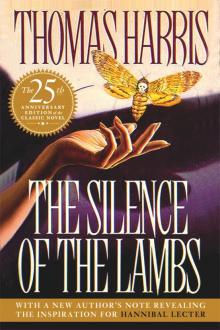 The Silence of the Lambs
The Silence of the Lambs Red Dragon
Red Dragon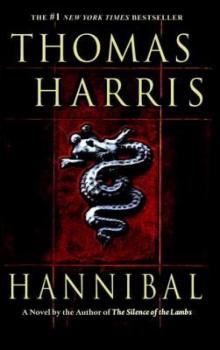 Hannibal
Hannibal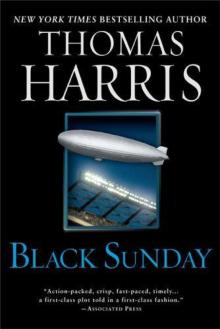 Black Sunday
Black Sunday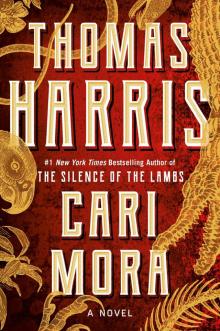 Cari Mora
Cari Mora Hannibal Rising
Hannibal Rising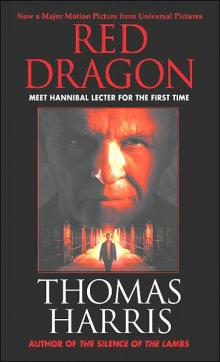 Red Dragon hl-1
Red Dragon hl-1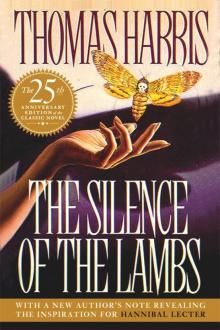 The Silence of the Lambs (Hannibal Lecter)
The Silence of the Lambs (Hannibal Lecter)